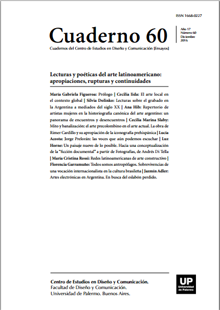Un paisaje nuevo de lo posible. Hacia una conceptualización de la “ficción documental” a partir de Fotografías, de Andrés Di Tella
Abstract
One of the most remarkable features of contemporary literature is the ambivalence in the definition of its fictional statute. In most of the novels and stories that have been published in the last decades fiction is, al least, ambiguous. In those texts, chronicle and autobiography, the reflection on the own writting process or the essay style merges with fictional narrative fragments producing a questioning of the fictional statute within literature in itself. In this article we affirm that documentary cinema is an appropriate site (a laboratory) to think the transformation of fiction in contemporary art. After the analysis of the documentary Photographies (2006) by Andrés Di Tella, certain procedures relating to how fiction arises inside are investigated. The expectation is that this research will serve as a theoretical basis for thinking the transformations that not only fiction category in the documentary film but also, more broadly, in other contemporary art forms, such as in literature.
References
Butler, J. (2003). Giving an Account of Oneself. New York: Fordham University Press.
Comolli, J. L. (2010). Cine contra espectáculo. Seguido de Técnica e ideología (1971-1972). Buenos Aires: Manantial.
Cowie, E. (1999). “The Spectacle of Actualtiy” en Gaines, J. and Renov, M. Eds. Collective Visible Evidence. Minneapolis: University of Minnesota Press.
Chanan, M. (2007). The Politics of Documentary. London: British Film Institute.
Derrida, J. (1995). Archive Fever: A Freudian impression. Chicago: University of Chicago.
Di Tella, A. (2012). “The Curious Incident of the Dog in the Nighttime” en Lebow, A. (ed.) The Cinema of Me. The Self and Subjectivity in First Person Documentary. New York: Columbia University Press.
__________. “La palabra documental”. Página 12. Jueves 28 de junio, 2012. Disponible en: http://www.pagina12.com.ar/diario/suplementos/espectaculos/5-25666-2012-06-28.html (último acceso junio 2014).
Firbas, P. y Meira Monteiro, P. (eds.) (2006). Conversación en Princeton. Andrés Di Tella: cine documental y archivo personal. Buenos Aires: Siglo XXI.
Fontcuberta, J. (2010). “Ficciones documentales” en La cámara de Pandora. La fotografía después de la fotografía. Barcelona: Gustavo Gili.
Franco, J. (2002). The Decline and Fall of the Lettered City. Cambridge, Mass.: Harvard University Press.
García Canclini, N. (2010). La sociedad sin relato. Buenos Aires: Katz.
Garramuño, F. (2009). La experiencia opaca. Buenos Aires: Fondo de Cultura Económica.
Ishizuka, K. y Zimmermann, P. (eds.) (2007). Mining the Home Movie: Excavations in Histories and Memories. Berkeley, CA: University of California Press.
Laddaga, R. (2006). Estética de la emergencia. Buenos Aires: Adriana Hidalgo Editora.
Laddaga, R. (2007). Espectáculos de realidad: ensayo sobre la literatura latinoamericana de las últimas dos décadas. Rosario: Beatriz Viterbo.
Lebow, A. (ed.) (2012). The Cinema of Me. The Self and Subjectivity in First Person Documentary. New York: Columbia University Press.
Link, D. (2006). Blog linkillo. Disponible en: http://linkillo.blogspot.com/2006/08/librosrecibidos_18.html (consultado en agosto del 2013)
Ludmer, J. (Julio 2007). “Literaturas posautónomas”. Ciberletras. Revista de crítica literaria y de cultura. 17.
__________. (2010). Aquí América Latina. Una especulación. Buenos Aires: Eterna Cadencia.
Metz, C. (1977). Le signifiant imaginaire: psychanalyse et cinema. Paris: Union génerale d’editions.
Montaldo, G. (2010). Zonas ciegas. Populismo y experimentos culturales en Latinoamérica. Buenos Aires: FCE.
Rancière, J. (2001). La fable cinématographique. Paris: Le Seuil.
__________. (2010). El espectador emancipado. Buenos Aires: Manantial.
Renov, M. (2004). The Subject of Documentary. Minneapolis: University of Minnesota Press.
Russel, C. (1999). Experimental Ethnography: The Work of Film in the Age of Video. Durham, NC: Duke University Press.
Visconti, M. (2011). “El principio del presente”. Revista afuera. 10, mayo. Disponible en: http://www.revistaafuera.com/articulo.php?id=139&nro=10 (consultado en noviembre de 2011)
Los autores/as que publiquen en esta revista ceden los derechos de autor y de publicación a "Cuadernos del Centro de Estudios de Diseño y Comunicación", Aceptando el registro de su trabajo bajo una licencia de atribución de Creative Commons, que permite a terceros utilizar lo publicado siempre que de el crédito pertinente a los autores y a esta revista.


